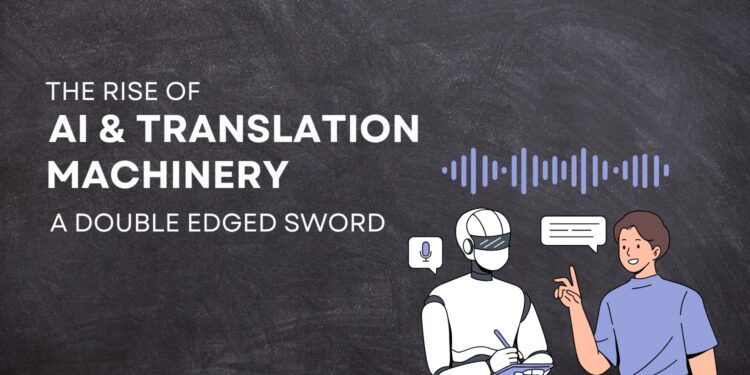The advent of artificial intelligence (AI) has revolutionized countless industries, and the language services sector is no exception. One of the most significant advancements in recent years has been the development of machine translation (MT) tools. These tools can rapidly translate vast amounts of text from one language to another, offering a seemingly efficient and cost-effective solution. However, as with any technological innovation, the rise of AI and MT presents both opportunities and challenges.
The Benefits of AI and Machine Translation
- Increased Efficiency: AI-powered MT tools can translate large volumes of text in a fraction of the time it would take a human translator. This can be particularly beneficial for businesses that need to process large amounts of content quickly, such as those in the e-commerce or marketing sectors.
- Cost-Effectiveness: MT tools can significantly reduce the costs associated with translation services. By automating the translation process, businesses can save on labor costs and expedite project timelines.
- Accessibility: AI-powered MT tools can make language services more accessible to individuals and organizations with limited budgets. This can help to break down language barriers and facilitate global communication.
The Limitations of AI and Machine Translation
- Quality Concerns: While MT tools have made significant strides in recent years, they still need to work on producing consistently accurate and nuanced translations. This is particularly true for complex texts that require a deep understanding of cultural context and linguistic subtleties.
- Cultural Nuances: MT tools often have difficulty capturing the cultural nuances and idiomatic expressions that are essential for effective communication. This can lead to misunderstandings and misinterpretations.
- Ethical Considerations: The use of AI in translation raises ethical concerns, such as the potential for bias in MT algorithms and the risk of job displacement for human translators.
Ensuring Quality and Accuracy in AI-Powered Translations
Despite the limitations of MT tools, it is possible to ensure that AI-powered translations are accurate and reliable. Here are some strategies that businesses can adopt:
- Human Post-Editing: Even the most advanced MT tools benefit from human post-editing. By having human translators review and edit the output of MT systems, businesses can ensure that translations are accurate, culturally appropriate, and stylistically consistent. Bolingo Consult specializes in post-translation editing to ensure that translations are accurate and culturally sensitive.
- Training and Customization: MT tools can be trained on specialized datasets to improve their accuracy for specific domains or industries. By customizing MT systems to meet the unique needs of a business, it is possible to achieve higher levels of quality.
- Leveraging Hybrid Solutions: A hybrid approach that combines AI and human expertise can often produce the best results. By using MT tools for routine translation tasks and reserving human translators for more complex or critical content, businesses can strike a balance between efficiency and quality.
- Ethical Considerations: Businesses should be mindful of the ethical implications of using AI in translation. This includes addressing issues such as bias in MT algorithms and ensuring that the use of AI does not lead to job displacement or other negative consequences.
Bolingo Consult’s Commitment to Quality
Bolingo Consult is dedicated to providing high-quality translation services that meet the unique needs of its clients. By combining the power of AI with the expertise of human translators, Bolingo Consult delivers accurate, culturally appropriate, and reliable translations. Bolingo Consult’s team of skilled experts is committed to staying up-to-date on the latest advancements in translation technology and best practices. This ensures that the team is able to provide clients with the most accurate and reliable translations available.
In a nutshell, the rise of AI and machine translation presents both opportunities and challenges for the language services industry. While MT tools can offer significant benefits in terms of efficiency and cost-effectiveness, it is essential to recognize their limitations and take steps to ensure that translations are accurate, culturally appropriate, and ethically sound. It is important to adopt a hybrid approach that combines AI with human expertise so that businesses can harness the power of technology while maintaining the highest standards of quality and accuracy. Bolingo Consult is committed to providing clients with the highest quality translation services, leveraging the best of both human and AI technology.










